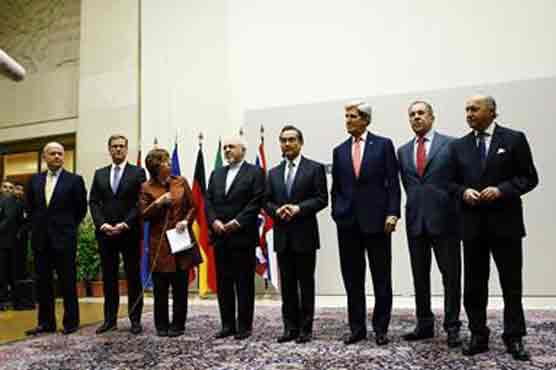Iran, six world powers clinch breakthrough nuclear deal

The deal was nailed down after more than four days of negotiations.
(Reuters) - Iran and six world powers reached a breakthrough agreement early on Sunday to curb Tehran s nuclear program in exchange for limited sanctions relief, in a first step towards resolving a dangerous decade-old standoff.
The deal between the Islamic state and the United States, France, Germany, Britain, China and Russia was nailed down after more than four days of negotiations.
"We have reached an agreement," Iranian Foreign Minister Mohammad Javad Zarif announced on his Twitter feed. French Foreign Minister Laurent Fabius also confirmed the deal.
Iran will get access to $4.2 billion in foreign exchange as part of the accord, a Western diplomat said. No other details of the agreement were immediately available.
U.S. Secretary of State John Kerry and foreign ministers of the five other world powers joined the negotiations with Iran early on Saturday as the two sides appeared to be edging closer to a long-sought preliminary agreement.
The talks were aimed at finding a package of confidence-building steps to ease decades of tensions and banish the specter of a Middle East war over Tehran s nuclear aspirations.
The Western powers goal had been to cap Iran s nuclear energy program, which has a history of evading U.N. inspections and investigations, to remove any risk of Tehran covertly refining uranium to a level suitable for bombs.
Tehran denies it would ever "weaponise" enrichment.
The draft deal that had been under discussion in Geneva would see Iran suspend its higher-grade uranium enrichment in exchange for the release of billions of dollars in Iranian funds frozen in foreign bank accounts, and renewed trade in precious metals, petrochemicals and aircraft parts.
Refined uranium can be used to fuel nuclear power plants - Iran s stated goal - but also provide the fissile core of an atomic bomb if refined much further.
Diplomacy was stepped up after the landslide election of Hassan Rouhani, a relative moderate, as Iranian president in June, replacing bellicose nationalist Mahmoud Ahmadinejad.
Rouhani aims to mend fences with big powers and get sanctions lifted. He obtained crucial public backing from Supreme Leader Ayatollah Ali Khamenei, keeping powerful hardline critics at bay.
On a Twitter account widely recognized as representing Rouhani, a message said after the agreement was announced, "Iranian people s vote for moderation & constructive engagement + tireless efforts by negotiating teams are to open new horizons."
The OPEC producer rejects suspicions it is trying covertly to develop the means to produce nuclear weapons, saying it is stockpiling nuclear material for future atomic power plants.
Israel says the deal being offered would give Iran more time to master nuclear technology and amass potential bomb fuel. Prime Minister Benjamin Netanyahu told local media in Moscow that Iran was essentially given an "unbelievable Christmas present - the capacity to maintain this (nuclear) breakout capability for practically no concessions at all".

